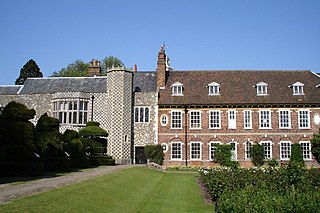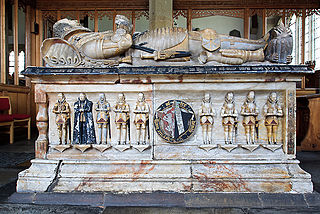
There have been two baronetcies created for persons with the surname Banks, on in the Baronetage of England and one in the Baronetage of Great Britain. Both creations became extinct on the death of the first holder.
Contents
The Banks Baronetcy, of London, was created in the Baronetage of England on 25 July 1661 for the wealthy merchant John Banks. He had no surviving male issue and the title became extinct on his death in 1699.

Sir John Banks, 1st Baronet FRS was an English merchant and MP, who rose from relatively humble beginnings to be one of the wealthiest merchants in London and owner of several properties.
The Banks Baronetcy, of Revesby Abbey in the County of Lincoln, was created in the Baronetage of Great Britain on 24 March 1781 for the naturalist, botanist and patron of the natural sciences, Joseph Banks. The title became extinct on his death in 1820.
A bogus Banks Baronetcy (of Nova Scotia) was for a while adopted by Thomas Christopher Banks (1765–1854), the notorious genealogist, lawyer and supporter of flimsy claims to dormant peerages, having purportedly been granted to him by one of his clients, a certain Alexander Humphrys, who laid claim (based on fraudulent documents) to the dormant Earldom of Stirling, which earldom had in accordance with rights conferred on William Alexander, 1st Earl of Stirling (d.1640) by King James VI of Scotland, the power to grant such baronetcies.
Thomas Christopher Banks (1765–1854), who for a while styled himself by the bogus title "Sir T.C. Banks, Baronet of Nova Scotia" was a British genealogist and lawyer. He is notorious for having assisted several claimants to dormant peerages, based on the very flimsiest evidence, which he strengthened with imaginary pedigrees. During his later years he resided near Ripon, Yorkshire.

Earl of Stirling was a title in the Peerage of Scotland. It was created on 14 June 1633 for William Alexander, 1st Viscount of Stirling. He had already been created a Baronet, of Menstrie in the County of Clackmannan, in the Baronetage of Nova Scotia on 12 July 1625, then Lord Alexander of Tullibody and Viscount of Stirling on 4 September 1630, then Earl of Dovan in 1639. He was made Viscount of Canada at the same time that he was granted the earldom of Stirling. The other peerage titles were also in the Peerage of Scotland. The titles became dormant upon the death of the fifth Earl in 1739.

William Alexander, 1st Earl of Stirling was a Scottish courtier and poet who was involved in the Scottish colonisation of Habitation at Port-Royal, Nova Scotia and Long Island, New York. His literary works include Aurora (1604), The Monarchick Tragedies (1604) and Doomes-Day.



